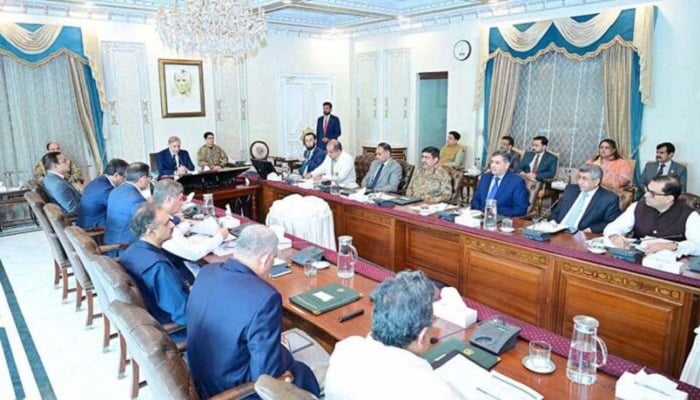

- PM says govt implementing strategy for sustainable energy reforms.
- Directs authorities to ensure timely completion of strategic projects.
- Minister says govt stepping back from direct power purchases.
Prime Minister Shehbaz Sharif on Wednesday approved a revised 10-year national electricity procurement policy, significantly reducing planned purchases from 14,000 megawatts (MW) to around 7,000MW, the power minister said in a statement.
The move is aimed at cutting the country’s reliance on costly, long-term contracts and fostering market-driven solutions.
The prime minister chaired a high-level meeting to review the Integrated Generation Capacity Expansion Plan (IGCEP) 2024–2034, reaffirming the government’s commitment to reducing electricity prices and implementing sustainable reforms in the energy sector, a Prime Minister’s Office news release said.
“After providing relief to the people with a significant tariff reduction, we are now implementing an effective strategy for sustainable energy sector reforms,” said the premier.
The PM directed the power authorities to ensure the timely completion of strategic projects like the Diamer Bhasha Dam, stressing the need for a robust system to harness the country’s water and power resources.
“Any delay in energy projects is unacceptable,” he said, adding, “We are moving towards establishing a free electricity market in the country very soon, which will promote competition and lead to further reduction in power tariffs.
The prime minister was briefed that the IGCEP had been thoroughly re-evaluated on his instructions, revealing room for improvement.
The revised plan, prepared through dedicated efforts by the Ministry of Energy, aligns better with ground realities and future demands.
The key highlights of the briefing included the implementation of competitive bidding for upcoming power generation projects over the next ten years.
Expensive power projects totalling 7,967MW are being removed from the plan. The revised project timelines and exclusion of costly ventures will result in estimated savings of $17 billion (Rs4.743 trillion).
Indigenous resources and alternative energy sources, such as solar, nuclear, and hydropower, will be prioritised over imported fuels, leading to significant foreign exchange savings.
Additionally, the gradual phasing out of capacity payments to power producers is part of the reforms.
PM Shehbaz praised Federal Minister for Power Sardar Awais Leghari and his team for their efforts, calling the massive savings a “historic success” for Pakistan.
The meeting was attended by the power minister, Minister for Economic Affairs Ahad Khan Cheema, Minister for Information Attaullah Tarar, Minister for Petroleum Ali Pervaiz Malik, and senior officials from relevant departments.
Meanwhile, the power minister in a statement said that with this shift, the government intended to save Rs4.743 trillion and shield consumers from rising costs.
“The government has canceled plans to procure 7,000MW of electricity to ease financial pressure on households and businesses,” the minister said.
Leghari said the administration was stepping back from direct involvement in power purchases, dropping the “single buyer” model.
“Instead, future transactions will occur through competitive markets to ensure transparency and efficiency,” the minister added.
Terming the reforms as “more critical than ongoing talks with Independent Power Producers (IPPs)”, the power minister stressed that they were more important than revising existing agreements with IPPs.
“This overhaul prioritises public welfare and fiscal responsibility,” Leghari added, signalling a broader push to stabilise Pakistan’s energy sector.







